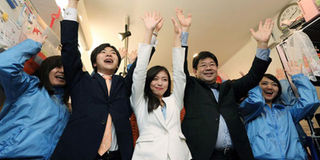Four new female mayors defy Japan's 'womenomics'

Rie Saito (C), a 31-year-old deaf former bar hostess, raises her hands in banzai cheers with supporters after she won the election for Tokyo's Kita ward assembly at her campaign office in Tokyo on April 27, 2015. Japan ranks 115th in a survey on the ratio of women in national parliaments below India, Malaysia and some African countries such as Zambia and Niger. PHOTO | AFP
What you need to know:
- They come four months after Abe won re-election as premier and as he continues to push the notion that Japan should be a place "where women can shine" — a policy he has dubbed "womenomics".
- As of 2013, the portion of women employed in senior positions in Japan's private sector stands at about 8 percent, and even lower in the public sector, at around 6 percent.
- Some women were elected in Sunday's polls, including Rie Saito, a deaf former bar hostess, age 31, who was elected to Tokyo's Kita ward assembly on the pledge of ending discrimination.
TOKYO
Local elections in Japan produced just four female mayors of the 222 positions up for grabs, results showed Monday, underlining the challenges for Prime Minister Shinzo Abe's pledge to put women in 30 percent of senior roles by 2020.
Nationwide there was an increase by one in the total number of female mayors and governors, to 26 of 1,788 posts after Sunday's polls.
Now two women are governors, and 24 are mayors — 20 of whom were not up for re-election this year.
There were vacancies for the top local job in 222 cities, towns and villages across the nation, but only 142 were contested. The remaining 80 won by default. Voter turnout was low across the country.
The elections, which also saw nearly 600 municipal assemblies elected, were the second wave after polls held earlier in the month.
They come four months after Abe won re-election as premier and as he continues to push the notion that Japan should be a place "where women can shine" — a policy he has dubbed "womenomics".
LOW NUMBERS
That is part of his drive to re-invigorate the economy, partly by getting more of the nation's under-employed but highly educated women into the workforce.
But, say observers, the lopsided results show Abe's 30 percent target for women occupying senior roles is still a long way off.
As of 2013, the portion of women employed in senior positions in Japan's private sector stands at about 8 percent, and even lower in the public sector, at around 6 percent.
"Four women in mayoral elections is certainly too low," said Midori Teramachi, a former assemblywoman in central Gifu prefecture and a member of a group working to increase the number of women in local assemblies.
"It's difficult for women to run for elections in the first place because of gender-based discrimination persisting in the countryside," she said, noting that male candidates rarely have responsibility for housekeeping and child-rearing.
Some women were elected in Sunday's polls, including Rie Saito, a deaf former bar hostess, age 31, who was elected to Tokyo's Kita ward assembly on the pledge of ending discrimination.
Despite its status as the world's third largest economy, Japan ranks 115th in a survey on the ratio of women in national parliaments below India, Malaysia and some African countries such as Zambia and Niger.





